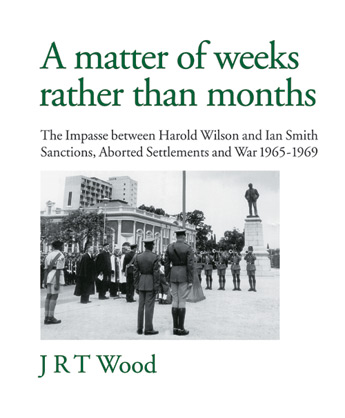
A Matter of Weeks Rather than Months
This book, A Matter of Weeks Rather than Months, is the third fruit of Dr Richard Wood's more than three decades of research using the hitherto closed collections of papers of Sir Roy Welensky, the former Prime Minister of the Federation of Rhodesia and Nyasaland, held in Rhodes House, Oxford, and of the former Rhodesian Prime Minister, Ian Douglas Smith, lodged in the Cory Library, Rhodes University. He has consulted the records of the British Government held in the British National Archives at Kew, London, and worked on the papers of the Rhodesian Army Association in the British Empire and Commonwealth Museum, Bristol, England.
Richard Wood's definitive series of post-Second World War Anglo-Rhodesian histories, The Welensky Papers: A History of the Federation of Rhodesia and Nyasaland: 1953-1963 (published in 1983) and So Far and No Further! Rhodesia's bid for independence during the retreat from empire: 1959-1965 (published in 2005), have earned him accolades. Michael Hartnack welcomed So Far, writing that 'Once in a lifetime comes a book which must force a total shift in the thinking person's perception of an epoch, and of all the prominent characters who featured in it.'
So Far and No Further! established the reasons why Ian Smith defied Britain and declared Rhodesia to be independent on 11 November 1965. A Matter of Weeks Rather than Months deals with the dilemma imposed on all sides by Smith's action. For Smith, the problem was how to legitimise his rebellion because, until he did, Rhodesia would be an international outcast, denied crucial investment capital, markets, trade and more. For the British, and more particularly their outraged Prime Minister, Harold Wilson, the challenge was how to end the rebellion and force the Rhodesians to accept African majority rule because Britain could not transfer sovereignty until Rhodesia was fully democratic. Anything less would split the Commonwealth and degrade Britain's standing in the world. Yet Wilson had eschewed the use of force for practical, logistical and political reasons which left him to attempt to impose sanctions on a landlocked country. As he did so, he predicted that Smith's Government would fall within weeks rather than months. The Rhodesians, protected by their South African and Portuguese neighbours, evaded the sanctions with such success that a political settlement leading to the transfer of sovereignty soon became increasingly attractive to the British. The result was that, while sanctions were tightened, the British and Rhodesians began to negotiate. Their negotiations, however, were doomed because the self-confident Rhodesians would not accept a period of direct British rule while rapid progress to majority rule was made or the imposition of restraints on powers they had possessed since gaining self-government in 1923.
While the British and the Rhodesian whites attepmted to negotiate their future, the African nationalists were not content to await the outcome. They had already adopted the concept of the armed struggle as the route to power and, sponsored by the Communist Bloc, its surrogates and allies, they began a series of armed incursions from their safe haven in Zambia. As yet, however, they lacked willing recruits or a population that welcomed their call for revolution. As A Matter of Weeks shows, their campaign was a failure but they would learn from their mistakes as the already over-stretched Rhodesian forces would discover in the 1970s.